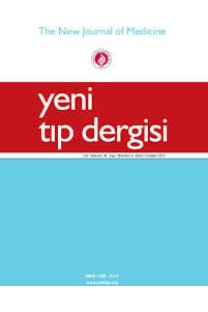Yaşamın güçlüklerine karşı tutumların değerlendirilmesi - Bursa'da 298 kişi üzerinde pilot çalışma
Evaluation of attitudes against difficulties of life-A pilot study of 298 subjects in Bursa
___
- 1. Tunks E, Bellissimo A. Behavioral Medicine: Concepts and Procedures. Stress, life events, and coping. New York, Pergamon 1991; p: 6.
- 2. Cohen S, Kessler RC, Cordon LU. Strategies for measuring stress in studies of psychiatric and physical disorders. In: Cohen S, Kessler RC, Gordon LU, ed. Measuring Stress: A Guide for Health and Social Scientists, New York: Oxford University Press 1995.
- 3. Engel GL. The need for medical model: A challenge for biomedicine. Science 1977;196: 129-36.
- 4. Wise TN. Psychiatric diagnosis in primary care: The biopsychosocial perspective. In: Leigh H, ed. Biopsycosocial Approaches in Primary Care: State of the Art and Challenges for the 21st Century, New York: Plenum Press 1997.
- 5. Steptoe A. Psychophysiological base of disease. In: Bellack AS, Hersen M, ed. Comprehensive Clinical Psychology, Amsterdam: Elsevier Science 1998: 39-78.
- 6. Epel ES, McEwen BS, Ickovics JR. Embodying psychological thinking: Physical thriving in response to stress. J Soc Issues 1998;54: 301-22.
- 7. Lazarus RS, Folkman S. Stress Appraisal and Coping, New York, Springer 1984.
- 8. Sarafino EP. Health Psychology: Biopsychosocial Interactions, New York, John Wiley & Sons 1990.
- 9. Rodin J. Health control and aging. In: Baltes MM, Baltes PB, ed. The Psychology of Control and Aging, Hillsdale, NJ: Erlbaum 1986; 139-65.
- 10. Seligman MEP. Learned Optimism, New York, Knopf 1990.
- 11. Kobasa SC, Maddi SR, Pucceti MC. Personality and exercise as buffers in the stress-illness relationship. J Behav Med 1982;5: 391-404.
- 12. Rakel. Textbook of Family Medicine, 7th ed. 2007 Saunders, An Imprint of Elsevier Chapter 4–Psychosocial Influences on Health. Syed M. Ahmed Jeanne P, Lemkau.
- 13. Baş T. ANKET. Seçkin Yayıncılık. ANKARA 2003.
- 14. William M. Trochim, Research Methods Knowledge Base-İnternal Validity Cornell University 2006.
- 15. Prof. Dr. Kazım ÖZDAMAR. Tıp Biyoloji Eczacılık ve Diş Hekimliği Öğrencileri İçin SPSS İle Biyoistatistik, Kaan Kitabevi 2001.
- 16. Öner N, Le Compte A. Durumluk-Süreklik kaygı envanteri el kitabı. 2. baskı Boğaziçi Üniversitesi yayınları. İstanbul 1998.
- 17. Nevzat Tarhan. Stresi mutluluğa dönüştürmek. Üzüntü alışkanlığı S.156-9. Timaş Yayınları. İstanbul 2002.
- ISSN: 1300-2317
- Yayın Aralığı: 4
- Başlangıç: 2018
- Yayıncı: -
Yaşamın güçlüklerine karşı tutumların değerlendirilmesi - Bursa'da 298 kişi üzerinde pilot çalışma
Oğuz TEKİN, Olgun GÖKTAŞ, Sevsen CEBECİ
Adına benzemeyen bir patoloji: Piyojenik granülom
Mehmet Oğuz YENİDÜNYA, Murat GÜREL
Orta konkanın intraosseöz hemanjiomu
Bahri KEYİK, Bahar YANIK, Zeynep Maraş ÖZDEMİR, Işık CONKBAYIR, Binnur Semiz ÖZKANLI, Baki HEKİMOĞLU
Fetal cinsiyetin gebeliklerin uzamasında rolü var mı?
İlknur İnegöl GÜMÜŞ, Zeynep KAMALAK, Serap SİMAVLI, Fatma YETİŞ, Nilgün Öztürk TURHAN
Hayriye KARABULUT, Baran ACAR, Kenan Selçuk TUNCAY, Taner TANYILDIZLI, Ayşe Serap KARADAĞ, Servet GÜREŞÇİ, Rıza Murat KARAŞEN
Lobular capillary hemangioma of the nasal valve area which appears during pregnancy
Hanifi KURTARAN, Nebil ARK, Türker YILMAZ, Aylin AYRIM, Davut AKTAŞ
Talasemi majorlu çocuklarda splenektominin bazı immünolojik parametrelere etkisi
Işık Yasemin BALCI, Yusuf POLAT, Meral TÜRK, Semra BALIN, Özlem ÖZLER, Kazım ATLIHAN
Brusella epididimo - orşitli bir olgu
Bayram DOĞAN, Abdullah Erdem CANDA, Ali Fuat ATMACA, M. Derya BALBAY
Jeneralize pruritus: Dahili bir patoloji mi yoksa somatizasyon mu?
Oğuz TEKİN, Evren SARIFAKIOĞLU, Pınar ÖZTAŞ, Olgun GÖKTAŞ
Deniz ERDEM, BELGİN AKAN, Demet ALBAYRAK, Fatma KARAKOÇ, Mustafa BAYDAR, Nermin GÖĞÜŞ
